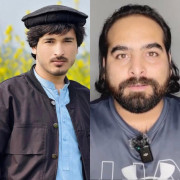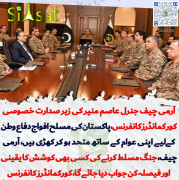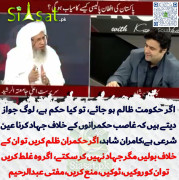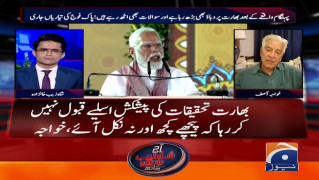M Ali Khan
Minister (2k+ posts)
http://weeklypulse.org/details.aspx?contentID=3888&storylist=1#.UeiMh_VAADY.twitter
MQM update Noose tightens around Altaf
By Abdul Khalique Ali
July 19, 2013

Scotland Yards case against Altaf Hussain is proceeding on three different linesDr Imran Farooqs murder, inciting violence and money laundering. Progress in each instance may appear to have hit a snag currently. However, as sources confide, the British police authorities are resolute about nailing the MQM leader on either of the three inter-linked charges of murder, incitement of violence and money laundering.
The London Metropolitan Police is clear about the murder story, including its reason, manner and perpetratorsand all it needs now is admissible evidence. It was for this very purpose that its Counter-terrorism Unit had recently arrested Iftikhar Hussain as he returned from Canada to Heathrow Airport. Despite subsequent release on bail of Altafs nephew and confidante due to his refusal to confess, police officials dealing with the case are confident about the veracity of their version of why and how Dr Farooq was killed, and who ordered, organized, handled and conducted his killing.
As for the reason for Dr Farooqs murder, it is already well reported in the press: that he wanted to launch his own party. As a co-founder of MQM, he had long been unhappy and aggrieved about the manner in which it was being led from London by Altaf and managed by loyalists at home. But Dr Farooq also knew about the consequences of doing so, which is why he had sought personal security from the Scotland Yard some months before his murder.
Even though the Metropolitan police subsequently failed to provide due security, resulting in Dr Farooqs murder in London in September 2010, but it was the first to reach his home soon afterwards. What it found under his bed, according to sources, were documents detailing MQM leaders links with Indian intelligence. Thus, instantly from the time the murder took place, the British police began building their case against Altaf. For he was the only one who could have felt directly threatened from Dr Farooqs bid to create a rival political party representing the Muhajirs of urban Sindh.
The murder trailbased on a variety of sources of information, especially travel records to and from the UK of individuals with links to MQM before and after the murderputs five individuals in the spotlight. They allegedly include Iftikhar as the organizer and Khalid Shamim as the handler. Khalid has been under ISI detention since late 2011, when he and two other unnamed MQM activists were reportedly arrested from Karachi airport, as they returned from Sri Lanka. Both are said to have committed the murder. Another MQM activist arrested from Lahore after the May elections is believed to have arranged finances for the deadly venture.
Reliable sources reveal that the alleged murderers had travelled to the UK on education visas, while Khalids visa was secured through a letter issued by a Karachi-based freight company. All of them were present in London during a couple of months prior to Dr Sattars murder, monitoring his movements. Within two days of the murder, they left the UK for different destinations in Europe onwards to South Africa and then to either Dubai or Doha. Whether they went to Karachi from there or headed to Sri Lanka or any other place is not clear yet. However, it is true that Khalids wife reported him missing in early 2011, and the case has been with the court since then.
The Scotland Yard did try to gain access to Khalid and the alleged killers during the former PPP-led government, but it was denied on one pretext or another, especially by former Interior Minister Rehman Malik. This does not appear to be the case with the PMLN government, which has publicly committed itself to cooperate with the British authorities with regard to Dr Farooqs murder investigations. Interior Minister Chaudhry Nisar is believed to have already allowed a special team of Scotland Yard that visited Pakistan recently to interview the four suspects involved in the murder.
The problem is that confession by any of these detainees cannot become admissible evidence in court proceedings on the case if and when they are initiated in the UK. One possible option being suggested by the British authorities is that they can be released from detention, then re-arrested by Pakistani police through proper judicial process and subsequently handed over to the UK under a special arrangement due to the non-existence of an extradition between the two countries.
The Sharif regime could be willing to cooperate with the British authorities, but would it have the support of the security establishment for the purpose? What the UK government is willing to offer in return is, therefore, equally important. The quid pro quo on its part may be to hand over the documents proving MQM leaders links with Indian intelligence recovered from under Dr Farooqs bed by the Metropolitan police soon after his murder. Pakistani authorities might as well demand that the British government should restrict the activities of Baloch separatist leader Harbyar Marri living in exile in the UK and possibly extradite him to Pakistan. But this is an option the British authorizes might not agree to.
This is where Dr Farooqs murder trail seems to have stuck currently. The BBC Newsnight programme, with a short documentary, broadcast last week may have kept the story alive. However, the subsequent attempt by BBC reporter Owen-Bennet Jones to publish its online version on the BBC website failed, with the editor particularly objecting to any reference in it to the documentary evidence linking MQM with Indian intelligence.
The said documentary unveils two additional but related issues that can potentially put Altaf Hussain in trouble. The first issues regards the reported references in his speeches to body bags, which amount to inciting violence in Pakistansomething that any person, however strong his leadership credentials are in a country of origin, cannot engage in, despite being a British citizen.
The UK authorities have to be serious in Dr Farooqs murder case, since it took place on British territory. Likewise, they cannot overlook any case pertaining to incitement to violence. Even in this instance, the evidence is not confined to controversial declarations made on tape by the MQM chief. PPPs estranged leader Dr Zulfiqar Mirza and PTI chief Imran Khan are also believed to have shared information with the British law-enforcement authorizes that may facilitate their efforts to indict Altaf Hussain on charges of inciting violence in Pakistanif the lack of admissible evidence eventually enables him to get off the hook in Dr Farooqs murder case. It is not a coincidence that both are also currently in London.
Finally, perhaps the most serious line in the British police case against the MQM leader pertains to money laundering. During last months raids at MQM Secretariat and Altafs residence in London, it reportedly recovered a sum of 400,000, for which no taxes were paid. The MQM leader has to prove the source of this income. It cannot be declared as a party fund, since he is not the party chief. So this is not an option anymore. But even if the MQM chief declares this amount as personal donations he has received from party memberswhich is the only option availablethen he has to explain why it was not declared with the British tax authorities.
The UK authorizes may be restrained to move swiftly against Altaf Hussain on Dr Farooqs murder case or the issue of inciting violenceas reliable sources reveal consistent tension between the Scotland Yard/Metropolitan police, on the one hand, and MI-6 and Foreign and Commonwealth Office, on the other, over these matters. Altafs Hussains vague warning during the recent visit of British Prime Minister David Cameron of serious consequences if the British became part of the Taliban conspiracy against the only secular force Pakistan has significantly contributed to this tension.
However, money laundering is a different ball game altogether. It is such a serious issue that any official British flexibility on MQM leaders case can have direct implications for many other such cases in future. Thus, even if the failure to secure admissible evidence may lead the murder investigations towards a dead end, and the issue of incitement to violence may continue to be overlooked for the sake of larger political interests, further progress in the money laundering case could eventually cost Altaf Hussain his current freedom to call the shots in Pakistan while sitting in London.
What will happen to MQM the moment he disappears from the public scene is anybodys guess!
MQM update Noose tightens around Altaf
By Abdul Khalique Ali
July 19, 2013

Scotland Yards case against Altaf Hussain is proceeding on three different linesDr Imran Farooqs murder, inciting violence and money laundering. Progress in each instance may appear to have hit a snag currently. However, as sources confide, the British police authorities are resolute about nailing the MQM leader on either of the three inter-linked charges of murder, incitement of violence and money laundering.
The London Metropolitan Police is clear about the murder story, including its reason, manner and perpetratorsand all it needs now is admissible evidence. It was for this very purpose that its Counter-terrorism Unit had recently arrested Iftikhar Hussain as he returned from Canada to Heathrow Airport. Despite subsequent release on bail of Altafs nephew and confidante due to his refusal to confess, police officials dealing with the case are confident about the veracity of their version of why and how Dr Farooq was killed, and who ordered, organized, handled and conducted his killing.
As for the reason for Dr Farooqs murder, it is already well reported in the press: that he wanted to launch his own party. As a co-founder of MQM, he had long been unhappy and aggrieved about the manner in which it was being led from London by Altaf and managed by loyalists at home. But Dr Farooq also knew about the consequences of doing so, which is why he had sought personal security from the Scotland Yard some months before his murder.
Even though the Metropolitan police subsequently failed to provide due security, resulting in Dr Farooqs murder in London in September 2010, but it was the first to reach his home soon afterwards. What it found under his bed, according to sources, were documents detailing MQM leaders links with Indian intelligence. Thus, instantly from the time the murder took place, the British police began building their case against Altaf. For he was the only one who could have felt directly threatened from Dr Farooqs bid to create a rival political party representing the Muhajirs of urban Sindh.
The murder trailbased on a variety of sources of information, especially travel records to and from the UK of individuals with links to MQM before and after the murderputs five individuals in the spotlight. They allegedly include Iftikhar as the organizer and Khalid Shamim as the handler. Khalid has been under ISI detention since late 2011, when he and two other unnamed MQM activists were reportedly arrested from Karachi airport, as they returned from Sri Lanka. Both are said to have committed the murder. Another MQM activist arrested from Lahore after the May elections is believed to have arranged finances for the deadly venture.
Reliable sources reveal that the alleged murderers had travelled to the UK on education visas, while Khalids visa was secured through a letter issued by a Karachi-based freight company. All of them were present in London during a couple of months prior to Dr Sattars murder, monitoring his movements. Within two days of the murder, they left the UK for different destinations in Europe onwards to South Africa and then to either Dubai or Doha. Whether they went to Karachi from there or headed to Sri Lanka or any other place is not clear yet. However, it is true that Khalids wife reported him missing in early 2011, and the case has been with the court since then.
The Scotland Yard did try to gain access to Khalid and the alleged killers during the former PPP-led government, but it was denied on one pretext or another, especially by former Interior Minister Rehman Malik. This does not appear to be the case with the PMLN government, which has publicly committed itself to cooperate with the British authorities with regard to Dr Farooqs murder investigations. Interior Minister Chaudhry Nisar is believed to have already allowed a special team of Scotland Yard that visited Pakistan recently to interview the four suspects involved in the murder.
The problem is that confession by any of these detainees cannot become admissible evidence in court proceedings on the case if and when they are initiated in the UK. One possible option being suggested by the British authorities is that they can be released from detention, then re-arrested by Pakistani police through proper judicial process and subsequently handed over to the UK under a special arrangement due to the non-existence of an extradition between the two countries.
The Sharif regime could be willing to cooperate with the British authorities, but would it have the support of the security establishment for the purpose? What the UK government is willing to offer in return is, therefore, equally important. The quid pro quo on its part may be to hand over the documents proving MQM leaders links with Indian intelligence recovered from under Dr Farooqs bed by the Metropolitan police soon after his murder. Pakistani authorities might as well demand that the British government should restrict the activities of Baloch separatist leader Harbyar Marri living in exile in the UK and possibly extradite him to Pakistan. But this is an option the British authorizes might not agree to.
This is where Dr Farooqs murder trail seems to have stuck currently. The BBC Newsnight programme, with a short documentary, broadcast last week may have kept the story alive. However, the subsequent attempt by BBC reporter Owen-Bennet Jones to publish its online version on the BBC website failed, with the editor particularly objecting to any reference in it to the documentary evidence linking MQM with Indian intelligence.
The said documentary unveils two additional but related issues that can potentially put Altaf Hussain in trouble. The first issues regards the reported references in his speeches to body bags, which amount to inciting violence in Pakistansomething that any person, however strong his leadership credentials are in a country of origin, cannot engage in, despite being a British citizen.
The UK authorities have to be serious in Dr Farooqs murder case, since it took place on British territory. Likewise, they cannot overlook any case pertaining to incitement to violence. Even in this instance, the evidence is not confined to controversial declarations made on tape by the MQM chief. PPPs estranged leader Dr Zulfiqar Mirza and PTI chief Imran Khan are also believed to have shared information with the British law-enforcement authorizes that may facilitate their efforts to indict Altaf Hussain on charges of inciting violence in Pakistanif the lack of admissible evidence eventually enables him to get off the hook in Dr Farooqs murder case. It is not a coincidence that both are also currently in London.
Finally, perhaps the most serious line in the British police case against the MQM leader pertains to money laundering. During last months raids at MQM Secretariat and Altafs residence in London, it reportedly recovered a sum of 400,000, for which no taxes were paid. The MQM leader has to prove the source of this income. It cannot be declared as a party fund, since he is not the party chief. So this is not an option anymore. But even if the MQM chief declares this amount as personal donations he has received from party memberswhich is the only option availablethen he has to explain why it was not declared with the British tax authorities.
The UK authorizes may be restrained to move swiftly against Altaf Hussain on Dr Farooqs murder case or the issue of inciting violenceas reliable sources reveal consistent tension between the Scotland Yard/Metropolitan police, on the one hand, and MI-6 and Foreign and Commonwealth Office, on the other, over these matters. Altafs Hussains vague warning during the recent visit of British Prime Minister David Cameron of serious consequences if the British became part of the Taliban conspiracy against the only secular force Pakistan has significantly contributed to this tension.
However, money laundering is a different ball game altogether. It is such a serious issue that any official British flexibility on MQM leaders case can have direct implications for many other such cases in future. Thus, even if the failure to secure admissible evidence may lead the murder investigations towards a dead end, and the issue of incitement to violence may continue to be overlooked for the sake of larger political interests, further progress in the money laundering case could eventually cost Altaf Hussain his current freedom to call the shots in Pakistan while sitting in London.
What will happen to MQM the moment he disappears from the public scene is anybodys guess!


























